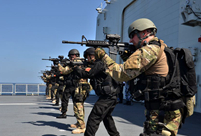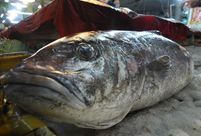 Bikini show in 2014 China Final of Miss Tourism World
Bikini show in 2014 China Final of Miss Tourism World
 Close-up view of August Aerobatic Team
Close-up view of August Aerobatic Team
 Goddesses married in 2014
Goddesses married in 2014
 Polar region photos raise worldwide awareness of global warming
Polar region photos raise worldwide awareness of global warming
 Get off at the last stop — Beijing Subway in vision
Get off at the last stop — Beijing Subway in vision
 Top 100 beauties in the world!
Top 100 beauties in the world!
 Gallery: Who is the most beautiful one?
Gallery: Who is the most beautiful one?
 If you like autumn, put your hands in the air!
If you like autumn, put your hands in the air!
 Fan Bingbing's "Queen style" in new play
Fan Bingbing's "Queen style" in new play
 Lingerie show at 2014 Miss China
Lingerie show at 2014 Miss China
BAGHDAD, Dec. 22 -- Under huge domestic and international pressure, Iraq formed a new government to bring about urgently needed reforms, and expanded U.S. support to fight back the growing threat of the Islamic State (IS) militants in Iraq and the region.
DIVISION, POOR GOVERNANCE EMPOWER IS IN IRAQ
More than eleven years of warfare since the U.S.-led invasion to Iraq, the fabric of Iraqi society has been deliberately changed. The country has seen further ethnic division, broken health and education facilities, and indiscriminate suicide bomb attacks against civilians.
After the U.S. troops withdrew from Iraq by the end of 2011, the rupture in the Iraqi society deepened by the poor governance of the country's government then, instead of being dwindled by the departure of foreign occupation.
The Sunni Arabs and Kurds have been at odds with the Shiite-dominated government, led by former Prime Minister Nuri al-Maliki, who has long been at odds with the Kurds over the distribution of oil wealth and the control of disputed areas outside the semi-autonomous region of Kurdistan.
While the Sunni Arabs carried out wide-spread and regular protests since December 2012, complaining about injustice, marginalization, discrimination, double standards and politicization of the judicial system. They also accusing the Shiite-dominated security forces of indiscriminately arresting, torturing and killing their sons.
Late in December 2013, the Sunni heartland of Anbar province turned to be the scene of fierce clashes that flared up after Iraqi police dismantled an anti-government protest site outside Ramadi.
In January 2014, tensions ran higher when Maliki's security forces captured the Sunni Arab tribal leader Ahmad al-Alwani and killed his brother.
The clashes between the Sunni tribal fighters and the security forces resulted in the capture of two major cities of Ramadi and Fallujah and some others nearby towns and villages in western part of the country.
The deep division in the Iraqi society and worsening security deterioration created a proper atmosphere for the extremist groups, including the al-Qaida breakaway group of Islamic State in Iraq and Levant (ISIL), later changed to Islamic State (IS), to gain support from the angry citizens.
The security situation in the country began to drastically deteriorate in June when bloody clashes broke out between Iraqi security forces anti-government tribal fighters backed by IS militants, who took control of the country's second largest city of Mosul in northern Iraq and later seized swathes of territories after the Iraqi security forces abandoned their posts in Nineveh and other predominantly Sunni areas in the provinces of Salahudin, Kirkuk and Diyala.
The IS acquired large quantities and variety of weapons, including tanks, armored vehicles and artillery and different kinds of missiles from the military bases in Mosul and other areas.
It was widely believed that the Sunni militants were combination of IS militants and some anti-government militant group, made up of tribal fighters, nationalist groups and non-Qaida Islamic groups, most of them were led by ex-army and security officers under Saddam Hussein.
The anti-government leaders mixed their old sophisticated urban combat tactics with the IS tactics learnt in their fighting in Syria.
However, most of the groups gradually disappeared from the scene of fighting particularly after the IS declared the establishment of the caliphate Islamic rule. The IS also demanded allegiance from all Muslims to the "caliph" Abu Bakr al-Baghdadi.
The declaration of IS as a caliphate on June 29 was seen as a threat to the entire region, not only in Iraq and Syria.
Three days later, then Prime Minister Nuri al-Maliki warned that "Daash (Arabic first letters of ISIL) has turned to be caliphate state and this is a message to the states in the region that you have become within the red circle. Daash was speaking about a state in Iraq and Sham (Levant), now it is speaking about caliphate in the region."
As IS becomes an imminent threat to stability and security in the area and the entire world, the international community is wondering how to eliminate such an extremist group.
The United States needed to apply a similar counterinsurgency to the one that helped bring security in the Sunni heartland of Anbar province in 2006 and 2007.
In Iraq, the main source of the insurgency comes from a marginalization of Sunnis by the Shiite-led Iraqi government, then the first step for any anti-IS strategy must send a message of reassurance to the disenfranchised Sunni community.
NEW IRAQI GOVERNMENT
On April 30, millions of Iraqis voted in the parliamentary election, which could have wide spread ramifications for the unity of Iraq and the region.
In Anbar, a heartland of Iraq's Sunni population and an epicenter of insurgency, many polling stations remained closed. Those who dared to vote did so under risk of attack from the IS militants, while hundreds of thousands of Anbar population were displaced by the battles in the cities of Ramadi, Fallujah and many other areas in the province.
Final vote tallies released on May 19 showed a strong lead by Maliki's election bloc, raising his chances for a third term as prime minister despite fierce internal and external opposition.
Maliki's State of Law political bloc is part of a Shiite umbrella organization named the Iraqi National Alliance, which garnered more than 170 seat in the 328-seat parliament, and was then announced the largest coalition in the parliament and has the right to form the government. Maliki argued that his bloc, which won 95 seats in April 30 elections, is the largest within the National Alliance, and he should stay on as head of the government.
But the Alliance see that the performance of Maliki's government brought the country to the brink of civil war and anticipate that the country is likely to split apart under Maliki's third term. It believes that the next prime minister must be accepted by the other political partners from the Kurds and Sunnis.
On August 11, Iraqi President Fuad Masoum asked Haider al-Abadi, 62, a politician with a western education background and a leading figure in Maliki's Dawa Party, to form the new cabinet.
Defiant Maliki rejected the nomination and resorted to the federal court as Abadi's nomination was a "mistake and violation to constitution" and vowed to remain in post until the court makes its final decision.
In mid-August, Maliki who had seem to be clinging to his post agreed to step down amid mounting pressure from the Obama administration and he was abandoned by some of his Dawa Party allies. He was also sidelined by religious and regional backers who no longer believe he can save the collapsing state.
Abadi urged the Iraqis to unite against the "barbaric" campaign waged by IS.
"We all have to cooperate to fight back the terrorist campaign waged on Iraq and to stop all terrorist groups," Abadi said during the ceremony just after Masoum had asked him to form a government.
The first step for Abadi was to reach out to the disenfranchised Sunni community and after intensive talks he signed a deal with the Sunni politicians which offered reassurances that he would meet the Sunni demands, including forming an inclusive government.
He also needed to reach out to the Kurds who were skeptical that Abadi would give up the past marginalization policies. They want Abadi to give in their key demands on oil exports, national budget, disputed territories and status of their regional security forces, known as Peshmerga.
On September 8, the country's parliament responded positively by approving Abadi's government, and about 40 days later the parliament okayed the remaining portfolios, including the two sensitive posts of interior and defense, with the support of Sunni and Kurdish politicians.
Abadi and his government have an ambitious agenda. They promised active political participation by all Iraqis, national reconciliation, fighting corruption, battling terrorism, and fixing Kurdish problems.
Meanwhile, the United States also declared the formation of a coalition to support anti-IS forces in Iraq and Syria via supplies and air support after the meetings of NATO summit in Wales in Great Britain on September 5.
EXPANDED U.S.-COALITION ROLE
Once taking office, Abadi has begun to carry out key reforms in such key cabinet ministries as the defense and interior. He sacked a number of commanders and replaced them with others. The move has received wide local and international support.
Late in November, Abadi said that he had discovered the first batch of forged names of more than 50,000 personnel, also known as ghost soldiers, in four army divisions. They were counted to be fighters, while they stay at their home and pay half of their salaries to some corrupt officers.
Iraq, on the other hand, suffers from hurdles in approving the annual budget of 2015 as the country is facing an all-out war against terrorism while its draft budget relies nearly 95 percent on oil revenues, while the crude oil prices are declining sharply in the world markets recently.
Under such situation, Abadi looks like waging simultaneously a war on several fronts. He's fighting terrorism, trying to rebuild mutual confidence with all Iraqi factions and cleansing the state institutions of what's appeared to be one of the biggest corruption operations in the world that destroyed most of the state resources and threaten the country with bankruptcy especially with the decline in oil revenues.
He is also striving to make a breakthrough in his tough haggling with political rivals to enact a law, mostly sought by the Sunni provinces that would allow their provinces to form forces from their own residents to protect themselves, as the Iraqi army has been burdened by a legacy of sectarianism for the Sunnis.
As for the Kurds, significant progress was made when Abadi's government reached an agreement with the Kurdish regional authorities over oil exports and budget payments.
According to the deal, the Kurdish region can export 250,000 crude oil barrels per day (bpd) from its oil fields and 300,000 bpd from Iraq's Kirkuk oil fields under the control of the State Organization for Marketing of Oil (SOMO) via Turkey's port of Ceyhan on the Mediterranean Sea.
In return, Baghdad's federal government will pay 17 percent of the national budget to the Kurdish regional government.
Abadi's reforms were necessary to unify Iraqis and to meet the strategy of the U.S.-led coalition, which only provides air strikes and weaponry to Iraq, but heavily relies on Iraqi forces on the ground, including Shiite-dominated forces, Sunni tribal forces and Peshmerga.
Early in November, U.S. President Barack Obama approved sending up to 1,500 more troops to Iraq, roughly doubling the number of U.S. forces on the ground. The troops' mission is to advise and train Iraqis in their battle against the IS militant group.
At the end of 2014, the Iraq is prepared to be the world's number one battleground against the extremist IS group which probably would last for years.
 Joint anti-piracy drill
Joint anti-piracy drill Unknown 'monster' fish caught in Shandong
Unknown 'monster' fish caught in Shandong 20 years on: Relocated Three Gorges residents through lens
20 years on: Relocated Three Gorges residents through lens Beautiful Chinese woman
Beautiful Chinese woman Chestnut girl goes viral online
Chestnut girl goes viral online PLA HK Garrison veterans leave behind beautiful smiles
PLA HK Garrison veterans leave behind beautiful smiles Victoria's Secret Fashion Show
Victoria's Secret Fashion Show Representative beauties
Representative beauties Excellent photos of Zhuhai Air Show
Excellent photos of Zhuhai Air Show AIDS response for expats
AIDS response for expats China set to lower GDP growth target
China set to lower GDP growth target Fake euros popular on Taobao
Fake euros popular on Taobao How long can Russia withstand the crisis?
How long can Russia withstand the crisis?Day|Week|Month